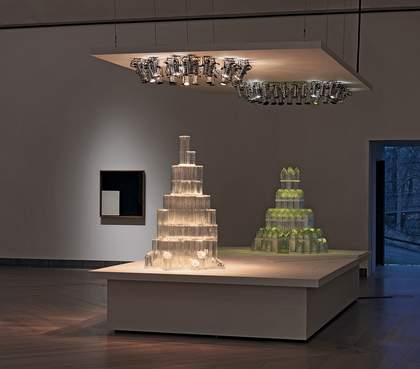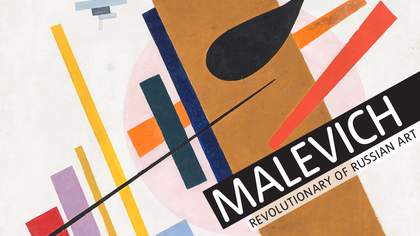
Installation view of Josiah McElheny’s Alpine Cathedral 2007 with Malevich’s Black and White Suprematist Composition 1915 behind, at Moderna Museet, Stockholm 2007-8
© Josiah McElheny, courtesy Moderna Museet, Stockholm
My first experience of engaging directly with Malevich’s work was when I had an opportunity to retell the story of early modernism in art, using the collection at the Moderna Museet in Stockholm. Part of my project was a re-staging of my work initially commissioned by the Museum of Modern Art in New York, The Alpine Cathedral and the City-Crown 2007 – which had at its centre two sculptural models of buildings inspired by the work of Bruno Taut and Paul Scheerbart. To me, the ideas proposed by Taut and Scheerbart represent a forgotten path of modernism.
For the exhibition, curator Iris Müller-Westermann and I removed the many modernist works from a large room in Moderna Museet, leaving only one Malevich painting - Black and White Suprematist Composition 1915 – and the model of Tatlin’s Tower. Then we put together a selection of paintings by Hilma af Klint for the other side of the room and a small ante-room, plus a painting by Giacomo Balla. By taking the Malevich out of its usual historic context, by de-historicising it one might say, the work became incredibly vibrant and ‘new’, and its meaning appeared to change. Being displayed near the Klint paintings, it seemed less about rationality and progress, but about something much more mystical.
The Suprematism movement gets associated with Constructivism and the idea of progress in image-making; even the name itself, its ‘supreme-ness’, implies paternalism and authoritarianism. But that was not really its intention. I think Malevich had much in common with his predecessor Klint – our very first abstract painter - in that he had great hopes for the transformative potential that his images could evoke. His idea of Suprematism was based on instinct and feeling or emotion, rather than a sense of rationality we often think we see in the work of, for example, Josef Albers.
And then there is the famous photograph of ‘The Last Futurist Exhibition of Painting 0:10’. For me, this picture prefigures ideas of exhibition display in the 1950s, 1960s and 1970s, inasmuch as it is about the body and how you experience something in space, as opposed to the notion of the image as bordered object. This picture led me to Malevich’s work on the opera Victory Over the Sun – for which he designed costumes and sets - and then to that of his colleagues Varvara Stepanova and Lyubov Popova, who were also making artworks as clothing and costume design. These artists were painting abstraction through the form of the body in the same way that ‘The Last Futurist Exhibition of Painting 0:10’ was a display of paintings about the body’s experience of form.
This is a really poignant subject today, because so much about abstraction has been critiqued in terms of authoritarianism and universalism – abstraction as ‘suprematism’ in the sense of it being a supreme expression of something. I agree with the critiques, but what’s missing are the hopes that it represented in Malevich’s time. These images, drawings, plans and costumes for operas and ballets are a clue to both the original meaning and perhaps also to an ongoing meaning for their work: abstraction through the subjectivity of the body.
Malevich seems to me to be a very hopeful artist today if you allow his work to resonate anew and realise that it comes not only out of history, but out of desire and hope and dreams.

